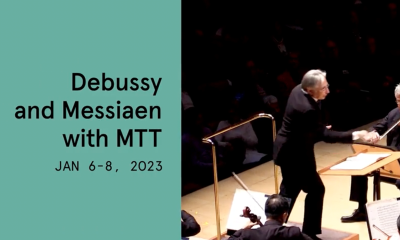Michael Tilson Thomas (MTT) walked quickly to the podium at Disney Hall and when he arrived, he stood, frozen, for an extended period of time, as if he were calling upon a moment of silence and so, when the first bars of Claude Debussy’s Prélude à L’Après-midi d’un faune were heard, they seemed to emanate from the stillness of MTT himself. The graceful movement of his hands and fingers seemed to magically transform a familiar piece of music into a work of slow pastoral simplicity, bringing new freshness and clarity to the score. During Denis Bouriakov‘s ornamental phrases on the flute one can imagine a peaceful, lush, exotic land (or you can imagine a faun playing a flute!). Surely, this was as gorgeous a way to begin the first of MTT’s January series of concerts with the LA Phil as anyone could ask for. The current French program (with a chunk of Brazil) plays through this Sunday January 8, 2023. Next weekend is Mahler’s Ninth.
Completing the first half was Olivier Messiaen’s Trois petites liturgies de la Présence Divine, one of the great mystical works in the Messiaen canon, begun in November 1943 in occupied Paris and completed March 1944. The text, written by Messiaen as he composed, often drew from his favorite sacred texts, although even with supertitled translations they can be difficult to digest — I found myself ignoring them completely to concentrate on the piece, which can be tough to listen to — especially if you are a musical layman. It is fascinating music, but should not be taken lightly, either. It becomes satisfying and stimulating as your understanding of the piece grows. Don’t expect to like it the first time if you’re not familiar with atonal stuff, but a lot of great music is that way — it takes time to digest and understand what was going on in the composer’s mind when he wrote it.
In the seventh volume of his Treatise on Rhythm, Color and Ornithology. Messiaen described his approach to writing this gloriously ethereal piece:
What does a rose-window in a cathedral do? It teaches through imagery, through symbolism, through all the characters that inhabit it — but what most catches the eye are its thousand spots of color which ultimately dissolve into a single, pure shade, so that someone looking on says only, ‘That window is blue,’ or ‘That window is violet.’
He wanted the listener to get lost in the brilliant colors of the music, not unlike his own experience with synesthesia — Messiaen saw colors whenever he listened to music. The score is speckled with color indications that hint at the colors he experienced. The words are set forth by a choir of women’s voices, sung sensuously and richly by members of the L.A. Master Chorale. In addition, there is an unusual ensemble of piano, played here by Jean Yves Thibaudet, string orchestra, percussion, ondes Martenot, an early electronic instrument that creates a ghostly and airy sound (played by Cynthia Millar). The piece is a perfect fit for Thibaudet, who clearly collaborates with others on stage: He rarely ever attacks the keys, and offers neat articulation.
Debussy returned in the second half of the program. Thibaudet has always had a strong interest in his fellow Frenchman and joined forces with the sensitive and passionate MTT for Debussy’s early Fantasie, composed in 1889-90 (though the composer tinkered with it later on). This extraordinarily successful performance was a palpable and expressive interpretation of the attractive three-movement work. Thibaudet in particular paced the music with grace and flexibility; fluid but not crisp. The work is less a piano concerto than a “Nights in the Gardens of France” (think piano concerto meets tone poem). Thibaudet and MTT found a touching, inward quality in the slow movement, marked Lento e molto espressivo, and plenty of light-fingered brio in the finale. Still, I never understood Thibaudet as a phenomenon. I found his playing a bit dulsatory, if not downright perfunctory, especially given an oddity of wrong notes. And in the You-Can’t-Fool-An-Audience department, there was polite applause, which made for one curtain call but no encore.
Ending the program was Chôros No. 10 “Rasga o Coração” (“It Tears Your Heart”), a work for chorus and orchestra written in 1926 by Brazil’s greatest composer, Heitor Villa-Lobos. It is part of a series of fourteen numbered compositions collectively titled Chôros, ranging from solos for guitar and for piano up to works scored for soloist or chorus with orchestra or multiple orchestras, and in duration up to over an hour. Chôros No. 10 is of moderate length, about 12 minutes, but this is the one you have been waiting for. Exciting, uplifting, and ingenious, it made me mourn for what “new” music should be — not experimental but twisting on previous conventions into a thrilling reinvention. A syntheses of Brazilian street, folk, and European “classical” music traditions, this choral-symphonic tour de force expresses the composer’s ardent nationalism. The fierce LA Master Chorale, under the direction of Grant Gershon, handily and thrillingly sang syllables that Villa-Lobos claimed were Incan. An incredible performance that wrapped up a wonderful program.
Debussy and Messiaen with MTT
Michael Tilson Thomas, LA Phil, LA Master Chorale
ends on January 8, 2023
for info, call (323) 850-2000 or visit LA Phil

